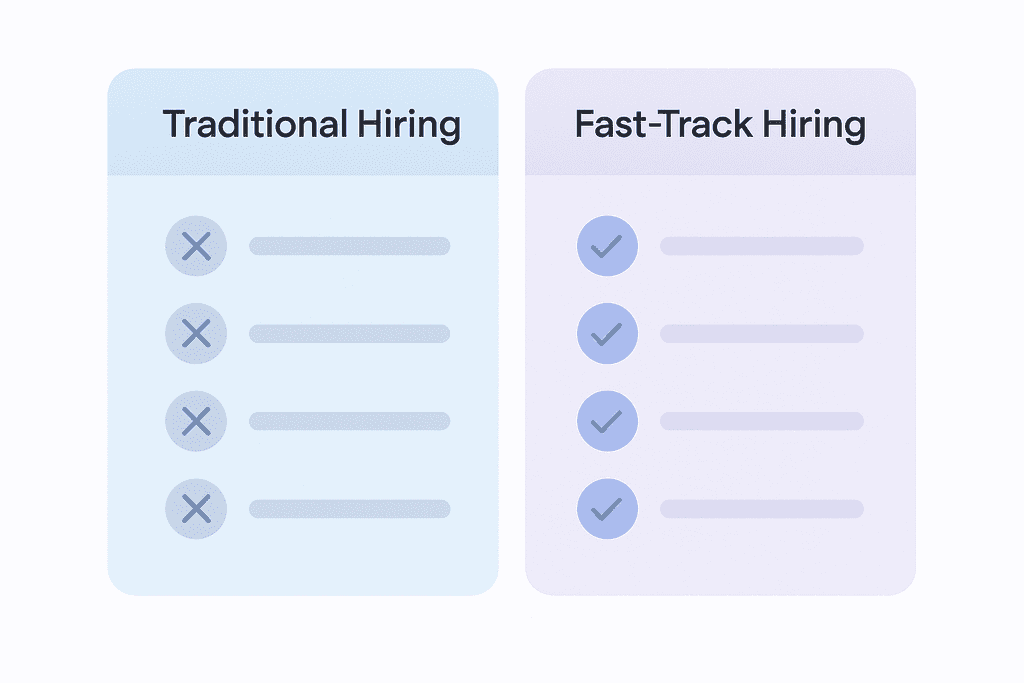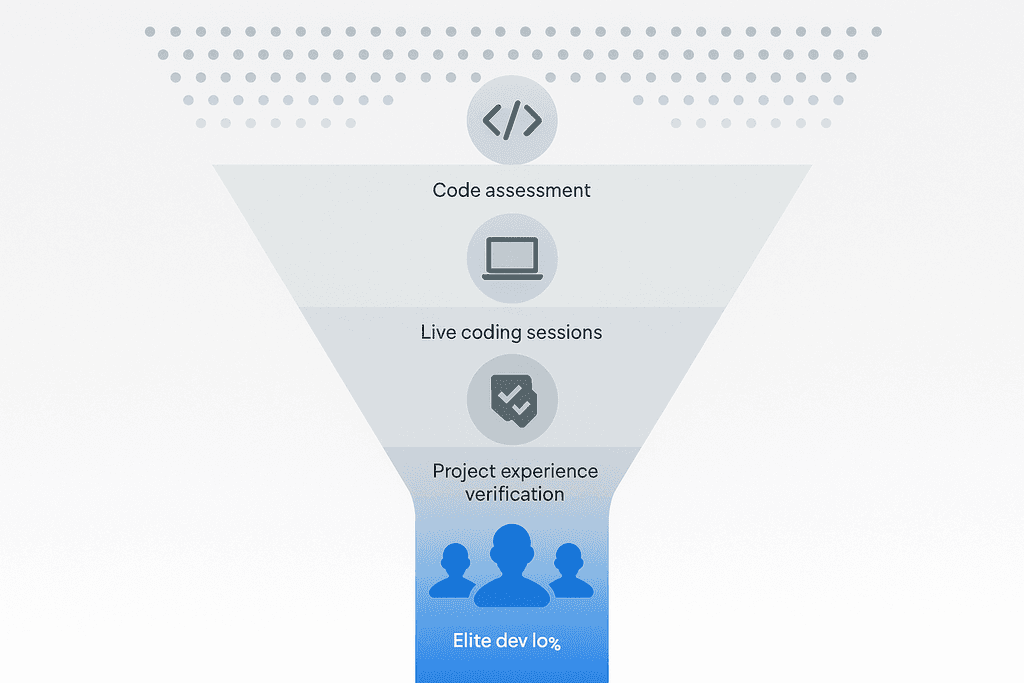
At epicX, we help real estate startups and growth-stage PropTech platforms hire dedicated real estate developers with direct experience in property management, listing systems, and tenant engagement tools. Build scalable, secure platforms with engineers who understand your domain.








Real estate and property tech products need developers who can do more than code. Our pre-vetted engineers understand market cycles, tenant expectations, compliance, and property data. From AI valuation tools to listing automation and digital tours, our developers come project-ready.
5+ Years Supporting PropTech Startups and Marketplace Platforms
Real-World Experience With PMS, MLS Integration, and CRM for Real Estate
Full-Stack Developers Skilled in Mobile, Web, and Geospatial Mapping
Scalable, Remote PropTech Teams With Direct Access and Full Ownership
Every PropTech product has its own unique workflow. We connect you with pre-vetted real estate developers who understand everything from MLS integrations and property management systems to smart building software. Build scalable, data-secure, and feature-rich platforms with the right team by your side.
Our engineers are skilled at integrating reliable, multi-currency, and PCI-compliant payment systems that power seamless transactions.
Work with real estate software developers who blend real estate domain fluency with hands-on expertise across the most in-demand PropTech technologies.
Whether you're building a next-gen rental platform or scaling a commercial property dashboard, epicX brings the technical expertise and team transparency real estate companies actually need.
We've supported rental platforms, brokerage tools, and smart building software, all built by real estate software developers with deep domain focus.
Work directly with your assigned engineers. No Proxies, No third-party bodies, just full accountability and real-time access to your dedicated real estate developers.
Our developers are tested in tools like MLS APIs, PMS workflows, and listing database management. You don't waste time with underqualified profiles.
We build agile teams that align with your time zones to help you hit your product roadmap milestones without bottlenecks or bloat.
Our developers follow best practices in encryption, access control, and secure cloud deployments to keep your property and user data safe.
Try out your software developer on live tasks with a risk-free trial. Move forward only if you're 100% satisfied with their performance and domain fit.


With epicX, you skip the learning curve. Our developers already know how real estate tech works, from property listings to transaction workflows. Here’s what clients typically gain:
Cut platform maintenance and dev costs by up to 30% by hiring pre-vetted developers who get it right the first time.
Launch features like virtual tours and dynamic maps up to 40% faster using engineers with real estate-specific experience
Improve agent and customer conversion by streamlining everything from onboarding to property recommendations
"It was the fastest we've ever hired vetted devs. And the quality? Outstanding."
"We were drowning in tech debt. epicX plugged in senior devs fast. Absolute lifesavers."
"We scaled our engineering team by 3x without touching recruitment or burning budget."
"We’ve worked with fancy agencies before. This felt different. Just pure focus and execution."
"It was the fastest we've ever hired vetted devs. And the quality? Outstanding."
"We were drowning in tech debt. epicX plugged in senior devs fast. Absolute lifesavers."
"We scaled our engineering team by 3x without touching recruitment or burning budget."
"We’ve worked with fancy agencies before. This felt different. Just pure focus and execution."
"It was the fastest we've ever hired vetted devs. And the quality? Outstanding."
"We were drowning in tech debt. epicX plugged in senior devs fast. Absolute lifesavers."
"We scaled our engineering team by 3x without touching recruitment or burning budget."
"We’ve worked with fancy agencies before. This felt different. Just pure focus and execution."
"Everything was perfect. No hand-holding, no surprises. Just people who know what they’re doing."
"No fluff, no waiting. Just solid engineers who got stuff done from week one."
"Never knew hiring could be this calm and predictable. Such a relief for our product team."
"Highly recommend them as a no-bullshit partner for anyone trying to scale engineering without chaos."
"Everything was perfect. No hand-holding, no surprises. Just people who know what they’re doing."
"No fluff, no waiting. Just solid engineers who got stuff done from week one."
"Never knew hiring could be this calm and predictable. Such a relief for our product team."
"Highly recommend them as a no-bullshit partner for anyone trying to scale engineering without chaos."
"Everything was perfect. No hand-holding, no surprises. Just people who know what they’re doing."
"No fluff, no waiting. Just solid engineers who got stuff done from week one."
"Never knew hiring could be this calm and predictable. Such a relief for our product team."
"Highly recommend them as a no-bullshit partner for anyone trying to scale engineering without chaos."

Your top developer prospect just took another job while you were setting up a third interview. Tech firms typically spend 42 days hiring one engineer. That's six weeks of lost work while rivals roll out features and gain market share.
Companies like epicX have changed this by pairing pre-screened developers with projects in under 48 hours. Yet, many teams remain bogged down by lengthy hiring processes, costing them both time and talent.
The average company takes 42 days to fill one developer role, and that's just the start. From job postings to screening resumes, multiple interviews, and negotiating offers, hiring can cost $15,000 to $30,000 per developer. Worse, about 30% of these candidates disappear before starting or leave within three months.

Traditional hiring isn't designed for speed. It suits environments where delays are manageable. But if your product roadmap demands next-month features, those 6-8 weeks of recruitment pose a business risk.
Teams often focus on visible costs like job board fees and recruiter commissions. The real damage lurks elsewhere. Every week without the right developer means stalled features, faster competitors, and lost revenue.
Here's what drains resources during traditional hiring:
When deadlines loom, companies face a choice: rush hiring and risk mediocre developers, or maintain rigorous vetting and see delays. According to recent research on developer productivity, team quality affects delivery speed more than anything else.
The screening process itself is a bottleneck. Traditional methods involve multiple interviews, assignments, and reference checks over weeks. Even platforms like Arc.dev or FullScale.io offering pre-vetted talent require your own thorough evaluations.
Companies like epicX eliminate these bottlenecks. Instead of weeks on job postings and candidate screening, you get matched with pre-vetted engineers in under 48 hours, with a 2-week trial to confirm fit before any long-term commitment.
Slow hiring's opportunity cost adds up daily. While stuck in interview loops, competitors are shipping features and gaining market share. The real question is whether you can afford not to hire faster.
Tech hiring often fails before meeting candidates. You post a job, wait for responses, and spend weeks on resumes that reveal little about coding skills.
By the time you schedule interviews, your best candidates have moved on. The average company takes 42 days to fill a developer role, even if everything goes smoothly.

Pre-Vetted Talent Pools Cut Screening Time to Zero
Pre-vetted talent pools change this process. Instead of starting from scratch, you choose from developers who have passed technical assessments.
These developers have proven skills in React, Python, and more through coding challenges, architecture reviews, and problem-solving tests.
What happens during pre-vetting:
Numbers tell the story. At epicX, only the top 5% of developers pass.
You're not sifting through mediocre candidates. You're selecting from a pool where each developer can build production-quality software.
This approach resolves the biggest time drain in hiring. Joel Spolsky noted it's hard to identify great developers in traditional interviews. Pre-vetting handles this upfront, so you're not gambling on coding ability.
The 94% first-match success rate is significant.
When epicX matches you with a developer, there's a 94% chance they become a long-term team member. Contrast this with traditional hiring, where multiple candidates are often needed to find the right fit.
With over 350 developers across 50+ tech stacks, matching is about finding the right developer for your specific needs.
Speed is crucial when building software. Every hiring week is a week competitors ship features. Traditional recruitment is slow because each step relies on the prior one.
You can't interview until resumes are screened. Offers wait until interviews finish. This sequential process means delays build up.
Fast matching is different. The heavy lifting is done. Technical vetting is complete, developers are ready, and matching focuses on fit.
When you submit requirements, you're not starting a months-long search. You're paired with developers who meet your technical criteria.
What gets evaluated during 48-hour matching:
The direct communication model removes another delay. You're not dealing with recruiters who miss technical nuances.
You talk directly with the developers joining your team. No misinterpretations of requirements. No middlemen adding days to each conversation.
This is vital for startups and scale-ups where timing is key. Fast hiring often leads to better outcomes as companies can seize market opportunities while others still interview.
Integration starts from day one, not week three.
When a developer joins through epicX, they're ready to work within your processes. They understand workflows, use project management tools, and adapt to code review practices.
There's no lengthy onboarding. They contribute immediately because they've done this before with other teams.
Hiring decisions feel permanent, making them daunting. You're committing to salary and benefits before knowing if someone can deliver. Bad hires cost money, momentum, and morale. The traditional model forces you to bet on interviews and references.

Risk-Free Trials Prove Quality Before Commitment
The 2-week trial changes this. You see actual work output before committing long-term. Not hypothetical exercises, but real contributions to your product. If the developer isn't right, you walk away without paying. If they're great, you continue working together.
What to evaluate during the trial:
This model shifts risk from you to the service provider. Most hiring approaches make you absorb all uncertainty.
You pay recruiters whether the hire works out or not. You invest in onboarding before knowing performance. The pay-only-if-satisfied model means epicX shares the risk. They succeed only when you're happy with the matched developer.
The productivity difference is immediate. Traditional hires spend weeks orienting, learning your codebase, and adapting to team dynamics.
Pre-vetted developers who've joined multiple companies know how to ramp up quickly. They read existing code, ask the right questions, and start contributing without hand-holding.
Compare the two approaches:
This approach suits startups managing tight budgets and fast-moving roadmaps. You can't spend months discovering a hire isn't working out.
The trial period compresses that learning into two weeks, giving you data to make confident long-term team decisions.
Companies often view hiring costs in terms of recruiter fees and job board subscriptions.
The real damage occurs during the search for the right developer. Each day without that senior backend engineer means stalled features, faster competitors, and a stretched team.
The average tech hire takes 42 days from posting to acceptance, not including notice periods and onboarding. For a startup burning $100k monthly, that's nearly $140k in runway used just waiting to fill one position.
Consider the numbers. If you need a developer for a feature generating $50k in monthly revenue, traditional hiring's six-week delay costs you potential earnings before they start.
This assumes your first hire is successful. Industry data shows 46% of new hires fail within 18 months, meaning many companies repeat this cycle for the same role.
While searching for talent, your current developers pick up the slack. They work longer hours, switch contexts between projects, and see productivity drop. Research shows overloaded teams lose 30-40% productivity to cognitive overhead and burnout risk.
In fast-paced markets, being second to launch means being irrelevant.
When competitors like arc.dev or fullscale.io promise quick placements yet take weeks to vet and match candidates, you still lose ground.
Companies winning now go from "we need a developer" to "they're shipping code" in days. At epicX, clients onboard pre-vetted engineers in under 48 hours, solving problems while competitors are still scheduling interviews.
The math is simple.
Faster hiring means faster shipping, leading to quicker revenue and learning. Every week shaved off your hiring timeline is a week of competitive advantage regained.
The numbers are clear. Traditional hiring averages 42 days to fill a developer role, assuming no ghosting occurs.
Meanwhile, pre-vetted talent pools match you with the right engineer in under 48 hours. This isn't just faster, it's the difference between launching next month or next quarter.
Here's the key. Speed helps when quality is ensured.
The old belief was choosing between speed or quality. But when working with developers pre-tested and vetted before you see their profile, you get both.
At epicX, we only work with the top 5% of engineers who've passed our screening, so you're not trading quality for speed.
The risk-free trial model changes the game. You get two weeks to see if the developer fits your team and can do the work. No upfront commitment, no long contracts. If it works, great. If not, you lose only a bit of time.
Most companies still think hiring must be slow and painful. But when your competitors move faster, that approach becomes a problem. The real question is whether you can afford not to hire quickly.
Speed and quality usually don't go together when hiring developers. Most companies assume they have to choose one or the other. But when you work with pre-vetted talent pools and proven matching systems, you can actually get both without compromise.
The speed comes from doing the hard work upfront.
At epicX, we pre-vet developers through rigorous technical testing before they ever enter our talent pool, so we're not starting from scratch when you submit requirements.
We only accept the top 5% of applicants, which means the matching process is about finding the right fit from an already elite group. The 48 hours is spent on alignment and compatibility, not on basic skill validation.
You get a 2-week trial period where you pay nothing upfront. If the developer isn't the right fit during those two weeks, you don't pay and we find you someone else.
Even after the trial, our 94% first-match success rate means most clients don't need replacements. But if issues come up later, we work directly with you to resolve them or provide alternatives quickly.
We cover over 50 tech stacks across web, mobile, cloud, and AI development. This includes popular frameworks like React, Angular, Node.js, Python, Java, and Ruby on Rails, plus specialized areas like machine learning,
DevOps tools (Docker, Kubernetes, Terraform), and cloud platforms (AWS, Azure, Google Cloud). If you're working with something more niche, we can usually source and vet specialists within the same timeframe.
Yes, because we match for timezone alignment and collaboration style, not just technical skills.
Our developers are experienced working remotely and plugging into existing workflows, whether you use Agile, Scrum, or Kanban. They join your Slack channels, attend your standups, and use your project management tools from day one.
There's no middleman layer, so communication is direct and they function as true team members.
The 2-week trial lets you evaluate real work output before committing any budget. You're not paying for promises or resumes, you're seeing actual code, communication quality, and team fit.
This removes the biggest risk in hiring, which is discovering problems after you've already invested time and money. Most platforms like arc.dev or fullscale.io charge from day one, but our model puts the risk on us to prove value first.
Skip the job boards, candidate ghosting, and weeks of screening.
Get top-tier engineers matched to your stack, ready to deliver.
No proxies, No middlemen. Just velocity.
2-Week No-risk trial. Pay only if satisfied.
✓ 50+ tech stacks
✓ 94% success on first match
✓ Talent matched in under 48 hours